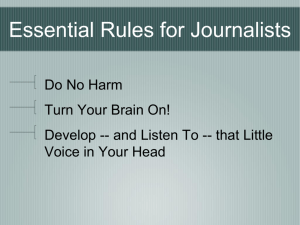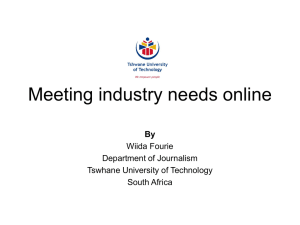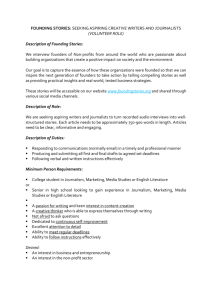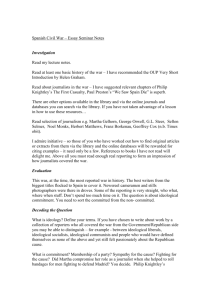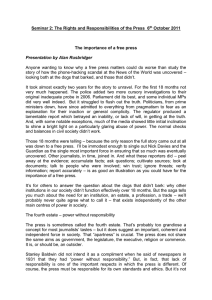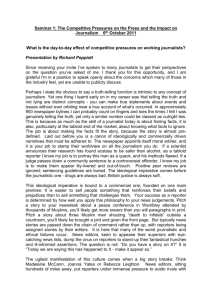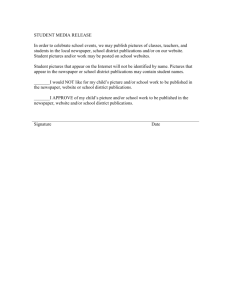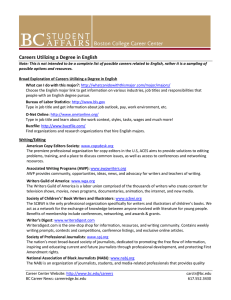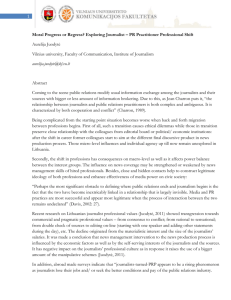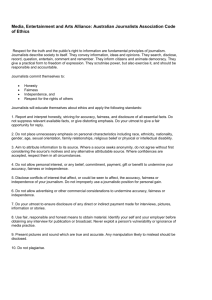Career Opportunities in Journalism - Cornell Institute for Public Affairs
advertisement
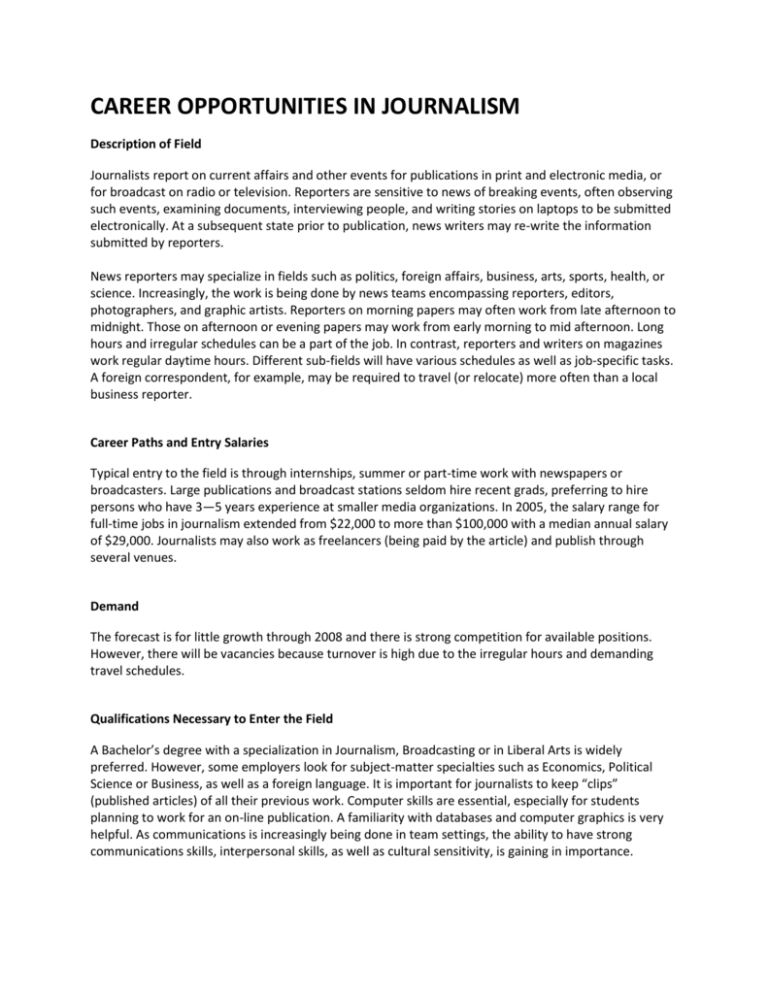
CAREER OPPORTUNITIES IN JOURNALISM Description of Field Journalists report on current affairs and other events for publications in print and electronic media, or for broadcast on radio or television. Reporters are sensitive to news of breaking events, often observing such events, examining documents, interviewing people, and writing stories on laptops to be submitted electronically. At a subsequent state prior to publication, news writers may re-write the information submitted by reporters. News reporters may specialize in fields such as politics, foreign affairs, business, arts, sports, health, or science. Increasingly, the work is being done by news teams encompassing reporters, editors, photographers, and graphic artists. Reporters on morning papers may often work from late afternoon to midnight. Those on afternoon or evening papers may work from early morning to mid afternoon. Long hours and irregular schedules can be a part of the job. In contrast, reporters and writers on magazines work regular daytime hours. Different sub-fields will have various schedules as well as job-specific tasks. A foreign correspondent, for example, may be required to travel (or relocate) more often than a local business reporter. Career Paths and Entry Salaries Typical entry to the field is through internships, summer or part-time work with newspapers or broadcasters. Large publications and broadcast stations seldom hire recent grads, preferring to hire persons who have 3—5 years experience at smaller media organizations. In 2005, the salary range for full-time jobs in journalism extended from $22,000 to more than $100,000 with a median annual salary of $29,000. Journalists may also work as freelancers (being paid by the article) and publish through several venues. Demand The forecast is for little growth through 2008 and there is strong competition for available positions. However, there will be vacancies because turnover is high due to the irregular hours and demanding travel schedules. Qualifications Necessary to Enter the Field A Bachelor’s degree with a specialization in Journalism, Broadcasting or in Liberal Arts is widely preferred. However, some employers look for subject-matter specialties such as Economics, Political Science or Business, as well as a foreign language. It is important for journalists to keep “clips” (published articles) of all their previous work. Computer skills are essential, especially for students planning to work for an on-line publication. A familiarity with databases and computer graphics is very helpful. As communications is increasingly being done in team settings, the ability to have strong communications skills, interpersonal skills, as well as cultural sensitivity, is gaining in importance. Sample Employers Wherever there is a daily or weekly newspaper, local television or radio station, magazines, or new media organization, there will be opportunities for employment. There is an emergence of twenty-four hour news and specialty networks and there are also numerous smaller publications that focus on law, politics, economics, government and defense on an international scope. Students are urged to use a portfolio to showcase their written, oral and graphics related communications skills. Resources for Additional Information Associations • • • • • American Society of Newspaper Editors www.asne.org International Center for Journalists www.icfj.org/ National Newspaper Association www.nna.org Newspaper Association of America www.naa.org Society of Professional Journalists www.spj.org/index.asp Internet Resources • • • • • • • Careers in Newspapers www.asne.org - Provides information and links to online issues of the ASNE Reporter. Dow Jones Newspaper Fund - http://djnewspaperfund.dowjones.com/fund/ - Career guide and internship information. JournalismJobs.com – http://www.journalismjobs.com - Career articles, jobs and internship, and other helpful information. Newsdirectory.com - http://newsdirectory.com/ - International list/links of newspapers. National Writer's Union - http:// www.nwu.org - Career resources for freelance writers. Writers Digest - http://www.writersdigest.com - Provides tips and information on how to get published in magazines and books - especially helpful are the "Writers Guidelines" and "Market of the Day" sections. Wetfeet www.wetfeet.com Publications Careers in Journalism. Jan Goldberg, McGraw Hill, 2005. Careers in International Affairs. Edited by Maria Pinto Carland and Lisa A. Gihring, Georgetown University Press, 2003. Editor and Publisher International Year Book. Editor& Publisher, 86th Ed. 2006. News Media Yellow Book. Leadership Directories, 2006. Opportunities in Journalism Careers. D. L. Ferguson and J. Patten, McGraw Hill, 2001. Note: Edited for the use of Cornell Institute for Public Affairs Fellows and alumni by the staff from the Office of Career Management. Written by Career Directors from the Association of Professional Schools of International Affairs.
